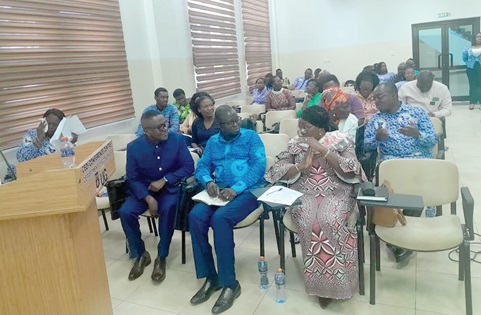
Pharmacy Council enhances operations with introduction of electronic system
The Pharmacy Council of Ghana (PCG) has successfully implemented the National Electronic Pharmacy Platform (NEPP).
The platform, which is operational and designed to transform pharmacy practice in the country, is integrated with some existing systems, including those of the Food and Drugs Authority, the National Health Insurance Authority and the Ghana Health Service.
The council’s secretariat has also been restructured to include Corporate Affairs and Legal units.
In addition, the council has increased the number of accredited universities training pharmacists from seven to eight to help improve the pharmacist distribution across the country.
The Board Chairperson of the council, Mrs Doris F.H. Addae Afoakwa, who announced this, said “we are proud to be a model for other countries in the sub-region and beyond”.
“Indeed, we have had delegates from the pharmacy councils of Nigeria, Rwanda and Kenya to understudy our NEPP.
“Together, we can guarantee the highest level of pharmaceutical care for the people of Ghana,” she added.
Mrs Afoakwa was speaking at the council’s 2024 stakeholders’ meeting in Accra.
In attendance were stakeholders from the Ministry of Health, the National Health Insurance Authority, the Pharmaceutical Society of Ghana, USAID and pharmaceutical companies across the nation.
Significance
The registrar of the council, Dr Daniel A. Danquah, said the meeting was necessary to enlighten members on how resources were utilised the previous year, while providing an opportunity to propose new funding sources for the coming year.
He said the central council's mandate was to ensure the safe use of medicines to enhance health outcomes for the citizens, adding that every regulatory action taken by the council was guided by this vision.
Dr Danquah said the council had also deployed some digital solutions and participated actively in a sub-regional pharmacy practice regulatory learning group (15 countries), facilitated by the Salient Advisory body based in Nigeria, over the period under review.
“Pharmacy practice regulation in Ghana is progressing steadily. We call on your continued support, commitment, guidance and collaboration as we leapfrog pharmacy practice in the country to the highest levels of pharmaceutical care one can find anywhere in the world,” he said.
Revenue generation
The Director of Finance of the council, Christopher Nyarkoh, in a report, said the council had made some growth in revenue generation from 2022 to 2023.
He, however, said capping of 34 per cent of the revenue had affected their operations.
“The council’s total revenue for 2023 was about GH¢22,736,096, but a capping of 34 per cent (GH¢7,689,991) left the total internally generated funds at GH¢15,046,105.03.
“After lobbying Parliament, now the capping has been reduced from 34 per cent to 20 per cent,” the director said.
Operational report
Highlighting the annual operational report, the Head of Registration and Licensing of the council, Pharm. Dr Mrs Brenda Yayra Oppong, said 420 pharmacists and 136 Pharmacy Technicians and 655 new over the counter medicine sellers (OTCMS) were registered, while 57 community pharmacies and 266 OTCMS were closed down for various offences.
